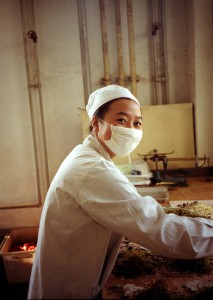 Acupuncture and the Emotions
Acupuncture and the Emotions
Chinese Medicine has long considered the psychology of patients. However, the cause of problems of anxiety and depression (as examples) are not simple “bad thinking” or chemical imbalances but the imbalances of the five elements and the interactions with their related organ systems.
I have had very good success using acupuncture and Chinese herbs for calming my patients and preventing anxiety attacks. It is useful to find the focus of the attack in the body. Many times panic attacks originate in the stomach, people often feel slightly nauseous before an attack starts. For others, there is a generalized anxious feeling that sometimes takes control of the person’s emotional well-being.
Often times stress is felt through an unconsious teeth grinding at night which leads to other symptoms like insomnia, sore neck or shoulders upon waking. or digestive upset. Treating stress at the root involves subtle attitude shifts with acupuncture and Chinese herbs.
When my patients say they are depressed I often see someone who is unhappy. This culture puts an inordinate number of pressures on us that heightens our sadness, anger or disappointment. I look for root causes of “depression,” and attempt change at that level, often successfully.
Nearly all of my most stressed patients fall asleep or “drift away” while on the treatment table.
In Chinese Medicine, the emotions affect the body as well as the body affecting the mind. In questioning, our patients we ask about the state of the emotions no matter what the primary complaint may be.
Depression may come from several factors. In general, the organ systems affected in Chinese Medicine are the Kidney, Liver and Heart. There might be a lack of “Qi” or energy which means that the heart and brain are not being nourished. For example , Chronic Fatigue patients (EBV) are often depressed because of this.
More commonly in the West is the “stagnation” of Stomach/Spleen Qi energy – meaning there is enough energy but it is not circulating throughout the body. Many times this patient is in Chinese Medicine is called “Damp” as evidenced by a thick coat on the tongue or a body that feels overweight.
The Liver energy can have particular influences on the emotions. “Liver Qi Stagnation” makes a normally calm person angry at little things. “Liver Rising” is a constant state of anger(think Road Rage). “Liver overacting on Stomach” happens when emotional upsets brings about nausea or an upset stomach.
If the heart is not nourished there can be depression and insomnia. The heart system is connected with the state of the blood (Xue) and may be seen in women after their period. Overthinking, worry and blood loss itself can lead to a depletion of heart energy. Often this leads to “free-floating” anxiety and the person not feeling grounded.
Finally the lung system is linked with sadness. The first thing one should do when depressed is try to get some oxygen in the lungs through gentle exercise such as walking.
The emotions and Chinese Medicine are quickly being developed into an exciting field in the West where patients often talk about their feelings and internal life. Chinese Medicine balances the energies of the body and when the body is balanced the mind can also relax. This relaxation is inherently calming to the mind/body.
This is from the book I wrote, Fundamentals of Chinese Medicine, for PMPH press. This is written for beginning acupuncture students.
The seven emotions are joy, anger, grief, thinking, sorrow, fear, and fright. The “seven emotional injuries” involve excesses or changes of emotion that cause disease. Historically, emotions have been considered as main factors in the cause of internal damage. They are said to often attack the internal organs directly where existing diseases are exacerbated or caused to deteriorate more rapidly. Chinese writings tend to stress the detrimental effects of excess emotion and over-stimulation of the spirit.
In most cases, emotions are normal reactions to various objects and phenomena outside of the body, and therefore do not cause problems. However, when emotional stimulation is sudden or intense or prolonged, normal physiological or psychological adaptation can be exceeded. At this time, any one of the seven emotions can result in damage to the essence and qi of the organs.
The seven emotions involve complex reactions in the body to the changes of internal and external environments based on the organs’ essence-qi. Therefore, the essence-qi of the organs is also the physiological basis for emotional activity. The five organs store essence, which can transform into qi, and the reactions of qi to environmental factors cause emotional activities. In this way, the essence-qi of the five organs will produce corresponding emotional activities. As is stated in the Yellow Emperor’s Inner Classic, the liver governs anger, the heart governs joy, the spleen governs thinking, the lung governs grief, and the kidney governs fear. Emotions are rooted in the strength of essence-qi of the five organs, as well as the smooth flow of qi and blood. If there is an excess or deficiency of essence-qi, the yin and yang of the five organs, or when the flow of qi and blood is disturbed, abnormalities of the emotions can also result.
The heart and liver play an especially important role in emotional activity. The heart stores the spirit and is the emperor of the five zang and six fu, governing and controlling both physical and the emotional activities. All emotion can be seen as a product of the harmony of essence-qi or the yin and yang of all the organs as dominated by the heart-spirit. Because the heart governs the spirit, any attack by any of the seven emotions will inevitably disturb the heart-spirit. An injury to the heart-spirit may then also affect the other organs and impair the free flow of qi flow, thus giving rise to disease.
Here is a review of a book concerning Chinese Medicine and psychology from The American Psychological Association website.


